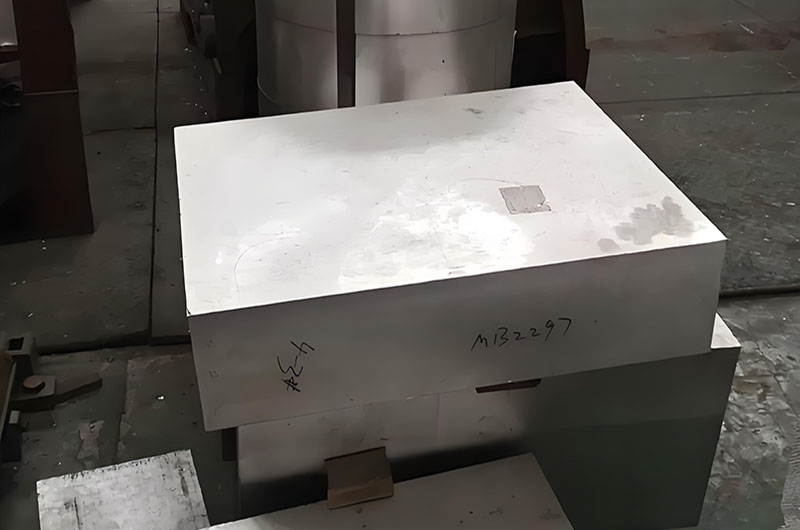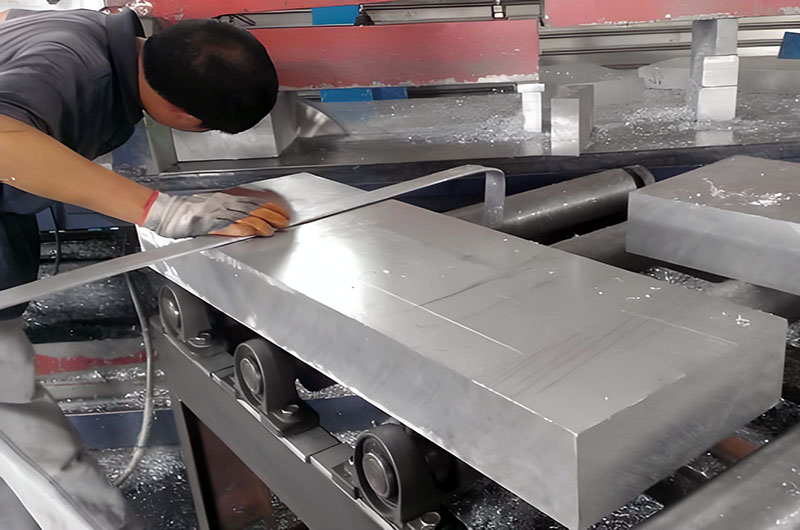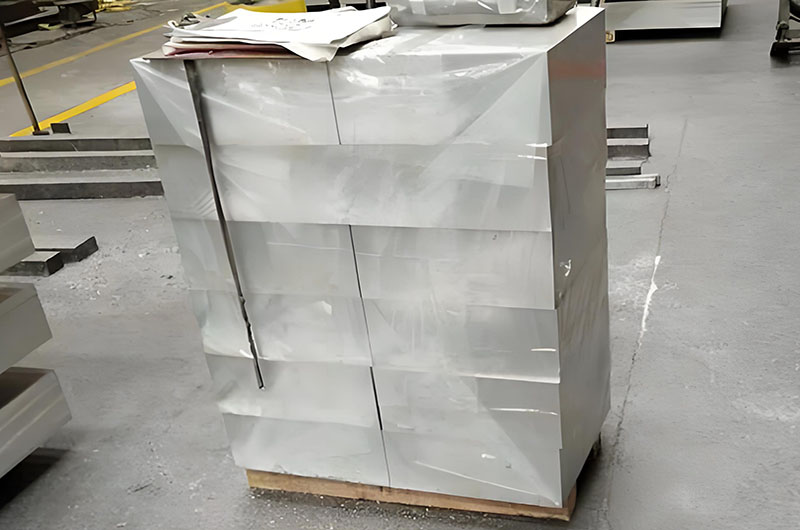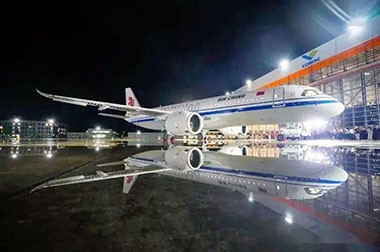7075 T6 Aluminum Block
7075 T6 aluminum block is an ultra-hard aluminum alloy, with zinc as the main alloying element, and achieves high strength and hardness through solution heat treatment and artificial aging (T6 condition). It exhibits excellent hardness and also has good low-temperature strength (below 150°C). The material may have residual stress internally, so caution is required regarding deformation risks during processing.
7075-T6 aluminum is a high-strength, heat-treatable alloy from the 7000 series. The production of 7075-T6 aluminum blocks begins with casting or forging solid billets, followed by specific heat treatment processes (solution heat treatment, quenching, and artificial aging) to achieve optimal mechanical properties.
7075 T6 aluminum block is a high-strength, lightweight material known for its excellent strength-to-weight ratio. This alloy is primarily used in aerospace, military, and high-performance applications, and achieves its best mechanical performance through heat treatment to the T6 condition, which involves solution heat treatment and artificial aging.

7075 T6 Aluminum Block Properties
- T6 Condition: "T6" indicates that the material has undergone solution heat treatment, quenching, and then artificial aging. This process promotes the formation of finely dispersed precipitates, hindering dislocation movement and significantly increasing strength.
- Machinability: Despite its high strength, 7075-T6 aluminum still has excellent machinability, making it ideal for manufacturing precision parts.
- Weldability: Due to its tendency to crack and the loss of strength in the heat-affected zone, welding is generally not recommended.
- Corrosion Resistance: While it has good corrosion resistance compared to other high-strength alloys, its corrosion resistance is not as high as some other aluminum alloys (such as those from the 6000 series), and it typically benefits from additional surface treatments like anodizing or painting.
7075 T6 Aluminum Block Standards and Certifications
Typical forms and sizes of 7075 aluminum include blocks, rods, and plates. Standard block sizes vary, and precision parts are often custom-machined.
- AMS: 4047, 4048, 4078
- ASTM: B209, B316, B221
Haomei Aluminum, as a professional manufacturer of 7075 T6 aluminum alloy, provides aerospace-grade aluminum blocks that meet AMS and ASTM standards. These blocks offer ultra-high strength, corrosion resistance, and excellent machinability, suitable for aerospace, military equipment, precision molds, and other fields. We support custom sizes and bulk orders, ensuring fast delivery and quality certification.
7075 T6 Aluminum Block Composition
Main Alloying Elements:
- Zinc: Approximately 5.1–6.1%
- Magnesium: Approximately 2.1–2.9%
- Copper: Approximately 1.2–2.0%
Additional elements: Traces of silicon, iron, manganese, chromium, titanium, and other elements ensure a balanced mixture, maximizing strength and machinability.

7075 T6 Aluminum Block Corrosion Resistance
Moderate; corrosion resistance is lower than 6061. It is prone to stress corrosion cracking. In corrosive environments, protective coatings or anodizing are recommended.
7075-T6 Aluminum Block Applications
7075-T6 Aluminum Block in Aircraft Structural Manufacturing
| Application | Description |
| Aircraft Wing Panels | 7075-T6 aluminum block is commonly used in the manufacture of aircraft wing panels. Due to its excellent strength-to-weight ratio and superior fatigue resistance, it can withstand the enormous aerodynamic loads during flight while maintaining structural stability. This material also has good corrosion resistance and wear resistance, ensuring reliable performance in various flight environments. |
| Stringers | 7075-T6 aluminum block is widely used in the manufacturing of aircraft stringers. Stringers, as essential load-bearing components of the aircraft structure, need to withstand complex bending and torsional loads. Its high strength and excellent machinability ensure the reliability and durability of the stringers while effectively reducing the overall weight of the aircraft, improving fuel efficiency and flight performance. |
| Fuselage Parts | 7075-T6 aluminum block is extensively used in the critical load-bearing structures of the aircraft fuselage. The fuselage must endure multiple loads such as pressure changes, gravity, and vibrations during flight. Its excellent mechanical properties and environmental performance ensure the overall strength and stability of the fuselage structure while meeting the aviation industry's requirements for material lightness. |
7075-T6 Aluminum Block in High-Stress Structural Components
7075-T6 aluminum block plays a crucial role in high-stress structural components. These components typically include landing gear assemblies, engine mounts, and connecting joints, which must endure high-strength loads under extreme conditions for long periods. The extremely high yield strength and fatigue resistance of 7075-T6 aluminum block ensure the reliability and safety of these critical parts during use, while extending their service life.
Other Applications of 7075-T6 Aluminum Block
- Industrial Manufacturing: Molds, mechanical equipment, tooling fixtures, and other fields with high precision requirements.
- Sporting Goods: High-strength lightweight products such as trekking poles.
- Military Equipment: Weapon components and corrosion-resistant structural parts.
- High-Performance Automotive Parts: Suspension components, racing parts.
- Other high-stress environments where weight reduction is needed.
7075-T6 aluminum blocks combine high strength, excellent machinability, and light weight, making them an ideal choice for critical high-performance applications.

7075-T6 Aluminum Block Comparison with Other Aluminum Alloys
How does 7075-T6 aluminum compare to 6061 aluminum alloy?
7075-T6 aluminum blocks significantly outperform 6061 aluminum alloy in terms of strength and hardness. Due to its higher zinc content and the T6 heat treatment state, 7075-T6 aluminum blocks have extremely high yield and tensile strength, allowing them to bear larger loads. This makes them ideal for structural parts in aerospace applications that require high strength. In contrast, 6061 aluminum alloy, while offering better corrosion resistance and weldability, has lower strength and is more suitable for components that are complex in structure, require welding, or are easy to machine. Therefore, for applications requiring extremely high load-bearing capacity, 7075-T6 aluminum is superior.
What is the difference between 7075 and 7075-T6?
7075-T6 aluminum blocks are 7075 aluminum blocks that have undergone T6 heat treatment, which significantly enhances their mechanical properties. The T6 condition includes solution heat treatment and artificial aging, which optimizes tensile strength, yield strength, and hardness. In comparison, 7075 aluminum blocks that are not T6-treated have better ductility and toughness but lower strength, typically used in applications requiring further processing or special manufacturing techniques. In the aerospace sector, 7075-T6 aluminum blocks, with their exceptional strength and fatigue resistance, are better suited for high-stress structural components.
Which is more suitable for aerospace?
7075-T6 aluminum blocks are more suitable for aerospace applications. Due to their extremely high strength-to-weight ratio and excellent fatigue resistance, 7075-T6 aluminum blocks are widely used in key load-bearing components such as aircraft wing panels, spars, and fuselage sections. In aerospace manufacturing, structural light weight and load-bearing capacity are core requirements, and 7075-T6 aluminum not only meets these demands but also provides good corrosion resistance and wear resistance. Compared to other aluminum alloys, 7075-T6 aluminum performs particularly well in extreme environments and under long-term load conditions, making it ideal for high-performance aerospace structural components.
Comparison with Other Alloys
- Compared to 6061-T6: Higher strength but lower corrosion resistance.
- Compared to 2024-T3: Better fatigue resistance; primarily alloyed with zinc and copper.
Machining and Processing of 7075-T6 Aluminum Block
- Good plasticity after solution treatment.
- Excellent heat treatment strengthening effect.
- Less prone to deformation or warping after processing.
Machining and Usage Considerations
- Machining Difficulty: High hardness requires specialized equipment, and stress release during machining needs to be controlled to prevent deformation.
- Weldability: Poor weldability, prone to cracking; riveting or bolted connections are recommended.
- Corrosion Resistance: Prone to stress corrosion cracking, surface treatments (such as anodizing) are recommended to enhance corrosion resistance.
7075-T6 aluminum blocks are the preferred choice for applications requiring high strength and lightweight performance but require a balance between corrosion resistance and weldability. They are widely used in critical aerospace and performance-driven industries.




